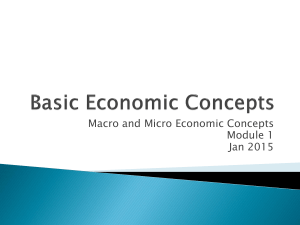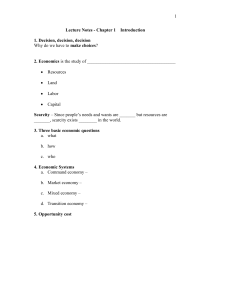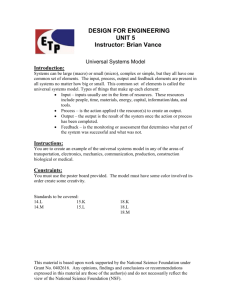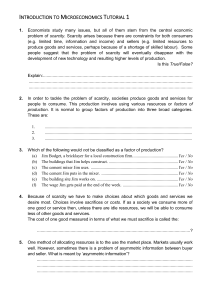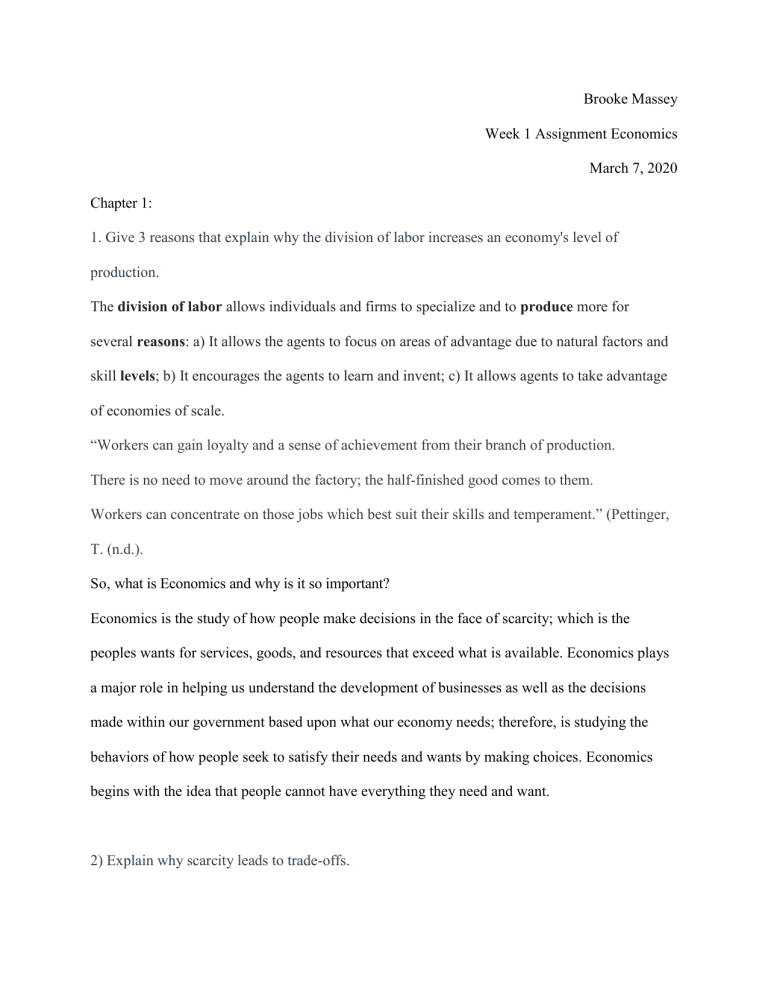
Brooke Massey Week 1 Assignment Economics March 7, 2020 Chapter 1: 1. Give 3 reasons that explain why the division of labor increases an economy's level of production. The division of labor allows individuals and firms to specialize and to produce more for several reasons: a) It allows the agents to focus on areas of advantage due to natural factors and skill levels; b) It encourages the agents to learn and invent; c) It allows agents to take advantage of economies of scale. “Workers can gain loyalty and a sense of achievement from their branch of production. There is no need to move around the factory; the half-finished good comes to them. Workers can concentrate on those jobs which best suit their skills and temperament.” (Pettinger, T. (n.d.). So, what is Economics and why is it so important? Economics is the study of how people make decisions in the face of scarcity; which is the peoples wants for services, goods, and resources that exceed what is available. Economics plays a major role in helping us understand the development of businesses as well as the decisions made within our government based upon what our economy needs; therefore, is studying the behaviors of how people seek to satisfy their needs and wants by making choices. Economics begins with the idea that people cannot have everything they need and want. 2) Explain why scarcity leads to trade-offs. The concept of trade-offs due to scarcity is formalized by the concept of opportunity cost. The opportunity cost of a choice is the value of the best alternative forgone. Similarly, there is an opportunity cost in everything: the opportunity cost of you being active and productive being what you could be doing with your time instead of doing nothing at all. When scarce resources are used (and just about everything is a scarce resource), people and firms are forced to make choices that have an opportunity cost. Since consumers’ resources such as time, attention, and money are limited, they must choose how to best allocate them by making tradeoffs. How do Economists use theories and models to understand important economic issues? Economists analyze problems and issues with economic theories that are based upon certain accusations about human behavior. The purpose of a theory is to take a real-life issue and simplify it, therefore giving them a better understanding of the problem and any additional issues around it. 3) “Microeconomics focuses on the actions of individual agents within the economy, like households, workers, and businesses. Macroeconomics looks at the economy as a whole.” (Steven A. Greenlaw, David Shapiro, 2017) a – Costco MICRO b - The Bahamas MACRO c - International trade MACRO d - GDP (Gross Domestic Product) MACRO e - Danielle's Plumbing and Heating MICRO f - Debra's Chicken Wings and Soda Fountain MICRO g – Inflation MACRO h - The Red Cross MACRO i - The City of Toledo, Ohio MICRO j - The effects of changes in tax policy MACRO 4) What would it cost Mike to move ..... from C F– to it would cost Mike 3 econ classes to make this move from D to B– it would cost Mike 4 weddings to make this move from E to A– it would cost Mike 8 weddings to make this move from B to D– it would cost Mike 2 econ classes to make this move References: Principles of Microeconomics, 2nd Edition. Authored by: OpenStax. Provided by: Rice University. Located at: http://cnx.org/contents/5c09762c-b540-47d3-9541dda1f44f16e5@8.1.. License: CC BY: Attribution. License Terms: Download for free at http://cnx.org/contents/5c09762c-b540-47d3-9541-dda1f44f16e5@8.1 Bureau of Labor Statistics, U.S. Department of Labor. 2015. “The Employment Situation—February 2015.” Accessed March 27, 2015. http://www.bls.gov/news.release/pdf/empsit.pdf. Williamson, Lisa. “US Labor Market in 2012.” Bureau of Labor Statistics. Accessed December 1, 2013. http://www.bls.gov/opub/mlr/2013/03/art1full.pdf. Pettinger, T. (n.d.). Division of Labour. Retrieved from https://www.economicshelp.org/blog/glossary/division-of-labour/
